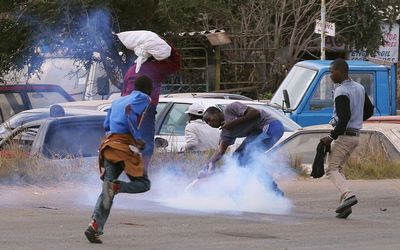PBS: Escaping Eritrea … [Read More...] about ካብ ውሽጢ ቤት ማእሰርታት ኤርትራ
Zimbabweans defy state call not to strike
Godfrey Marawanyika and Chengetai Zvauya | July 07 2016 | Business Day
ZIMBABWE deployed its police force in the capital, Harare, on Wednesday as thousands of workers heeded a call to join a strike over an economic collapse that has led to a shortage of cash, import controls and the failure of the government to pay salaries on time.

While the government warned workers not to join the stayaway, some schools were closed and there was little traffic on main roads into the city. Most companies in Harare’s industrial areas were shut. The labour action was called following the finance ministry’s announcement that it was delaying pay for state workers including the military and riots sparked by protests by taxi drivers over alleged police harassment.
“The civil servants have the right to protest, but there are procedures that have to be followed,” Acting Public Service Minister Supa Mandiwanzira said on Wednesday. “Those processes have not been exhausted. If they take part in an unsanctioned process, there will be consequences, and they must disregard this call for a stayaway.”
President Robert Mugabe’s administration has faced a worsening cash shortage in recent months. Since abandoning its own currency in 2009 to end hyperinflation, Zimbabwe has used mainly US dollars, as well as South African rand, euros and British pounds. The government spends about 83% of its revenue on wages for state workers, according to Finance Minister Patrick Chinamasa.
On Monday, Harare was hit by riots as minibus taxi operators staged demonstrations in suburbs across the capital to complain that police routinely demand money when they stop vehicles to check whether they are roadworthy.
Police responded by unleashing dogs, firing tear gas and arresting 95 people. Violent clashes also erupted last weekend at Zimbabwe’s main border post with SA, forcing its closure, when the government banned the import of certain goods.
There was further unrest in the western Harare suburb of Mufakose on Wednesday and people tried to loot shops before police brought the situation under control, police spokeswoman Charity Charamba said. Fifteen people were arrested in Harare and 17 in the Matabeleland North province, while figures from other provinces were not yet available, she told reporters.
Zimbabwe Lawyers for Human Rights staff were responding to arrests in Harare and the towns of Victoria Falls and Zvishavane, Kumbirai Mafunda, a spokesman for the civil rights group, said.
Ten people were arrested in Chipenge, said Claris Madhuku, a political activist in the southeastern town.
Police detained five journalists who were reporting on the upheaval and forced them to delete their pictures before releasing them, said Forster Dongozi, the secretary-general of the Zimbabwe Union of Journalists. “We are going to be suing the minister of home affairs and police commissioner-general,” Dongozi said. “This is not acceptable.”
The Postal and Telecommunications Regulatory Authority of Zimbabwe said that social media and cellphones were being used to distribute “abusive and subversive materials” and warned that those responsible could be prosecuted.
Most of the Zimbabwean countryside, where the majority of the population lives, was unaffected by the strike, Education Minister Jonathan Moyo said in a Twitter posting.
The Apex Council, which represents public servants, had received reports of some teachers who had joined the strike being intimidated to return to work, chairwoman Cecilia Alexander said.
